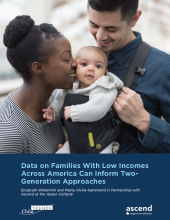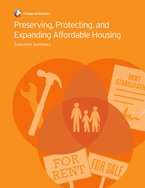Found 31 resources.
0
0
0

The COVID-19 pandemic has upended life for children and families globally. The health, economic, educational and related stressors have contributed to mental health challenges for people of all ages, including our youngest and those who care for them.
In a new report, the Children's Equity Project, in partnership with the Buffett Early Childhood Institute at the University of Nebraska and Yale University, highlights the mental health of the early care and education workforce and the children they care for using data collected over the course of the pandemic in 2020 and 2021.
The...
Topics: COVID-19, Early childhood, Education, Legislation & Policy, Low-income, Mental health, Racial inequalities
 Shared by Sandra Ware
on May 17, 2023
Shared by Sandra Ware
on May 17, 2023 0
0
0

We are delighted to share a new research report in partnership with Child Trends: Data on Families with Low Incomes Across America Can Inform Two-Generation Approaches. In this new analysis, research experts Elizabeth Wildsmith and Marta Alvira-Hammond paint a detailed picture of how families in households with low incomes in the United States have changed since 2011. The report highlights 10 key findings from their analyses of family economic and social conditions related to financial security and mobility, family structure and living arrangements, education and employment, parental health,...
Topics: dual-generation initiative, Early childhood, Education, Health, Housing, Legislation & Policy, Low-income, Racial inequalities
 Shared by Sandra Ware
on Mar 2, 2023
Shared by Sandra Ware
on Mar 2, 2023 0
0
0

At this time of year, pull up to a busy intersection or pass by some popular public gathering place in and around Durham, and there’s a good chance you might find a sign advertising “PreK for All.” January kicks off Durham PreK’s annual recruitment campaign for the approaching school year, and if you have a rising preschooler in your life, you may be wondering what it means to offer pre-k for all.
The resulting report, “Toward Equity in Durham PreK: Addressing the Accessibility of Wraparound Care as a Barrier to Universal PreK in Durham,” details the findings, identifies key program...
Topics: COVID-19, Early childhood, Education, Funding, Housing, Legislation & Policy, Low-income, Racial inequalities
 Shared by Sandra Ware
on Mar 2, 2023
Shared by Sandra Ware
on Mar 2, 2023 0
0
0

Two housing justice advocates discuss different approaches to policy change and the importance of centering the voices of people most affected by systemic barriers and inequities in housing.
Topics: Advocacy, Housing, Legislation & Policy, Low-income, Racial inequalities
 Shared by Sandra Ware
on Jan 3, 2023
Shared by Sandra Ware
on Jan 3, 2023 0
0
0
Medical debt is a critical challenge to Americans’ financial stability and well-being. People with medical debt are more likely to forgo needed medical care, have difficulty meeting basic needs, and face an increased risk of bankruptcy.
Recent Urban research shows there are great disparities in who carries the most medical debt. Adults who live in communities where the majority of the population are people of color are more likely to have medical debt in collections reported on their credit reports. In particular, Black adults are more likely to have difficulty paying for family medical...
Topics: Asset building, Dual-eligibles, Health, Legislation & Policy, Low-income, Medicaid / Medicare, Racial inequalities
 Shared by Sandra Ware
on Oct 27, 2022
Shared by Sandra Ware
on Oct 27, 2022 0
0
0
Keynote: Michael Bennet (D-Co), Congressional Video Message.
Plenary: Reducing Childhood Poverty.
Following Housing Is' 2019 Summit discussion of reducing childhood poverty and the idea of a university child allowance, this panel will explore the renewed discussion of legislation around a child tax credit and the idea of a universal basic income.
Topics: Child welfare, Community development, Housing, Legislation & Policy, Low-income, Racial inequalities, Youth
 Shared by Housing Is
on May 18, 2021
Shared by Housing Is
on May 18, 2021 0
0
0
CLPHA developed a general data sharing template that public housing authorities (PHAs) and their health partners can customize to suit their data sharing and collaboration needs. Please feel free to comment to share any uses/modifications your organization made to implement into a partnership.
Topics: Affordable Care Act, CLPHA, Community development, Cost effectiveness, Data sharing, Dental, Depression, Dual-eligibles, Funding, Health, Healthy homes, Legislation & Policy, Low-income, Medicaid / Medicare, Mental health, Metrics, MTW, Nutrition, Obesity, Partnerships, Place-based, Preventative care, Racial inequalities, Research, SAMHSA, Smoke-free, Stability, Substance abuse, Supportive housing, Sustainability, TA
 Shared by Steve Lucas
on Aug 5, 2019
Shared by Steve Lucas
on Aug 5, 2019 0
0
0

Charlotte city planners working to rewrite outdated zoning codes are exploring a controversial and bold idea of eliminating single-family zoning. Leaders are following cues from other cities like Minneapolis, Minnesota, and Grand Rapids, Michigan, which have taken the step in an effort to undo decades of racial segregation and income inequality in housing.
Topics: Housing, Legislation & Policy, Low-income, Racial inequalities, South
 Shared by Housing Is
on May 20, 2019
Shared by Housing Is
on May 20, 2019 0
0
0
In fact, Syracuse’s experience feels both unique and all too common for U.S. cities, particularly Great Lakes cities: federally sanctioned housing disinvestment; sprawling outward development; stagnating or declining and
segregated population; fractured local government and school systems; and outdated infrastructure.
Topics: Community development, Housing, Legislation & Policy, Low-income, Racial inequalities, Research
 Shared by Housing Is
on May 10, 2019
Shared by Housing Is
on May 10, 2019 0
0
0

Miami is projected to face anywhere from 1 to 3 feet of sea level rise by 2060, and as sea levels rise, higher ground inland has started to look more and more desirable. Much of that higher ground is in the city's poorest neighborhoods, like Liberty City and Little Haiti. The shifting real estate landscape is just one example of how, in Miami, the effects of global warming are not hypothetical predictions but realities of everyday life, prompting action by government, businesses and individuals alike. Across the region, developers are changing how they build, wealthy homeowners are...
Topics: Community development, Housing, Legislation & Policy, Low-income, Racial inequalities, South
 Shared by Housing Is
on Apr 4, 2019
Shared by Housing Is
on Apr 4, 2019 0
0
0
Last month, the Los Angeles County Board of Supervisors voted unanimously to dedicate $5 million to preventing housing discrimination and to develop an ordinance to protect housing choice voucher holders from source of income discrimination. The supervisors have until May to draft the ordinance’s language and have not yet developed a timeline for enacting it, but these actions are a step toward expanding voucher holders’ housing options.
Topics: Housing, Legislation & Policy, Low-income, Racial inequalities, West Coast
 Shared by Housing Is
on Mar 13, 2019
Shared by Housing Is
on Mar 13, 2019 0
0
0
Child poverty in the U.S. could be cut in half over the next 10 years with a few simple steps, according to a new report from the National Academies of Sciences, Engineering and Medicine. The cost would be high — at least $90 billion a year. But the National Academies report warns that the price of not doing anything would be far greater.
Topics: Child welfare, Criminal justice, Early childhood, Education, Food insecurity, Funding, Health, Immigrants, Legislation & Policy, Low-income, Nutrition, Racial inequalities
 Shared by Housing Is
on Mar 12, 2019
Shared by Housing Is
on Mar 12, 2019 0
0
0

Disasters are becoming more common in America. In the early and mid-20th century, fewer than 20 percent of U.S. counties experienced a disaster each year. Today, it's about 50 percent. According to the 2018 National Climate Assessment, climate change is already driving more severe droughts, floods and wildfires in the U.S. And those disasters are expensive. The federal government spends billions of dollars annually helping communities rebuild and prevent future damage. But an NPR investigation has found that across the country, white Americans and those with more wealth often receive...
Topics: Community development, Funding, Housing, Legislation & Policy, Low-income, Racial inequalities, Research, Stability
0
0
0
Despite that consensus, the digital divide is about to get worse, and current policies will exacerbate it. We need to replace those policies with a coordinated approach that provides appropriate incentives for all stakeholders to bridge widening gaps.
Topics: Broadband, Legislation & Policy, Low-income, Racial inequalities
0
0
0
The map focuses on four critical areas of policy: protections against source-of-income discrimination, the regulation of short-term rentals, inclusionary housing programs, and rent control. The rising tide of state preemption detailed in this tool makes it clear that local initiatives and innovation are being blocked when the need for affordable housing and creativity in advancing inclusion is most needed.
Topics: Housing, Legislation & Policy, Low-income, Racial inequalities, Research
0
0
0
NLIHC stands ready to work with all members of Congress to seize the opportunity to address the full scope of affordable housing challenges for families with the greatest needs. In the memorandum below, we provide our recommendations on steps Congress can take—whether through an infrastructure spending package, the appropriations process, housing finance reform, or other legislative avenues—to make the critical investments in the affordable housing our nation needs to help the economy, our communities, children and families thrive.
Topics: Child welfare, Community development, Criminal justice, Funding, Homelessness, Housing, Legislation & Policy, Low-income, Mobility, Racial inequalities, Safety
 Shared by Housing Is
on Jan 30, 2019
Shared by Housing Is
on Jan 30, 2019 0
0
0
Affordable housing campaigns are not new, of course, but what is unprecedented and transformative about Opportunity Starts at Home is the scope and diversity of the partners that are joining forces to advocate for more robust and equitable federal housing policies. The campaign is advised by a Steering Committee including leading national organizations representing a wide range of interests that are working shoulder-to-shoulder to solve the affordable housing crisis.
Topics: Asset building, Child welfare, CLPHA, Community development, Early childhood, Education, Food insecurity, Funding, Health, Homelessness, Housing, Immigrants, Legislation & Policy, Low-income, Mobility, Out-of-school time, Partnerships, Racial inequalities, Safety, Seniors, Stability, Substance abuse, Youth
0
0
0
This study explores the different ways undocumented status is associated with residential decisions and its implications on residential segregation. Drawing on 47 interviews with 20 undocumented-headed Mexican households in Dallas County, Texas, researchers examine the drivers of residential decisionmaking and illustrate the complex trade-offs undocumented households make between neighborhood quality and legal risk.
Topics: Housing, Immigrants, Legislation & Policy, Low-income, Mobility, Racial inequalities, South
 Shared by Housing Is
on Jan 17, 2019
Shared by Housing Is
on Jan 17, 2019 0
0
0

Some 15% of U.S. households with school-age children do not have a high-speed internet connection at home, according to a new Pew Research Center analysis of 2015 U.S. Census Bureau data. New survey findings from the Center also show that some teens are more likely to face digital hurdles when trying to complete their homework.
Topics: Broadband, Education, Legislation & Policy, Low-income, Racial inequalities, Research
0
0
0
Housing and school segregation function as mutually-sustaining phenomena that limit perceived housing and school choices, constrain social networks, and curb employment and educational potential. Despite the link between housing and school segregation, however, many initiatives combating segregation tend to focus on one or the other instead of recognizing their inherent connectedness.
Topics: Data sharing, Dual-generation, Education, Housing, Legislation & Policy, Low-income, Mobility, Partnerships, Racial inequalities, Research
0
0
0

On September 20, 2018, a panel of researchers and practitioners discussed new research and ongoing challenges associated with the HCV program at HUD’s Quarterly Update from the Office of Policy Development and Research.
Topics: Housing, Legislation & Policy, Low-income, Mobility, Racial inequalities, Research
0
0
0
For years, Dallas has poured millions of federal dollars into affordable housing, to little effect. But in May, the City Council unanimously passed a new comprehensive housing policy, a first for the city. The goal is to build 20,000 new homes — but only in select, pre-approved neighborhoods deemed ripe for revitalization.
Topics: Community development, Housing, Legislation & Policy, Low-income, Mobility, Racial inequalities, South
0
0
0

Through the hard work of communities around the country, we now have proof of something that we didn’t before—that ending homelessness is achievable. Home, Together builds upon what we have learned from states and communities over time, and lays out the strategies we know we must advance at the federal level in order to support and accelerate state and local progress.
Topics: Cost effectiveness, Data sharing, Disabilities, Dual-generation, Homelessness, Housing, Legislation & Policy, Low-income, Mental health, Partnerships, Preventative care, Racial inequalities, Stability, Substance abuse, Supportive housing
 Shared by Housing Is
on Aug 7, 2018
Shared by Housing Is
on Aug 7, 2018 0
0
0
This review discusses how attitudes toward affordable housing are likely shaped by factors that influence other social policy attitudes— particularly ideology and stereotyping. The author concludes with recommendations and methods that planners can use to manage public opposition and influence attitudes toward affordable housing.
Topics: Housing, Legislation & Policy, Low-income, Racial inequalities, Research
 Shared by Housing Is
on Jul 27, 2018
Shared by Housing Is
on Jul 27, 2018 0
0
0
The tools and strategies included here provide communities with ideas and inspiration to help them plan for healthy housing for all their residents. They include best practices culled from across the United States as well as new ideas.
Topics: Funding, Health, Homelessness, Housing, Legislation & Policy, Low-income, Racial inequalities, RAD
 Shared by Housing Is
on Jul 13, 2018
Shared by Housing Is
on Jul 13, 2018 

